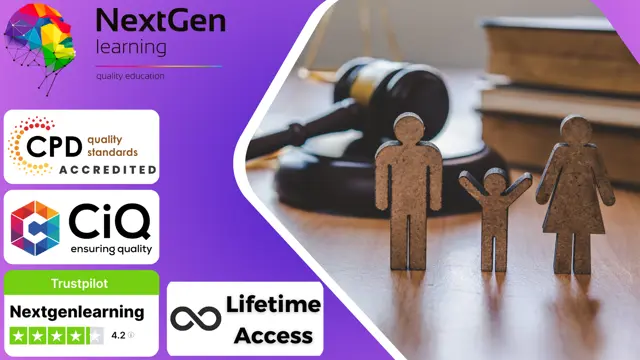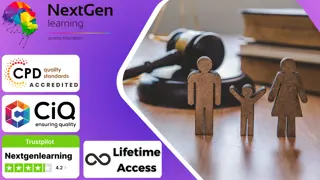
Family Law Training Course
CPD Accredited | Flash Deal > Free Reed PDF Certificate > No Hidden Fees > Lifetime Access
NextGen Learning
Summary
- CPD Quality Standard Certificate - Free
- Reed courses certificate of completion - Free
- Tutor is available to students
Add to basket or enquire
Overview
Discover the lucrative world of Family Law with our Family Law Training course. Unlock the secrets of marriage, divorce, child custody, and property disputes under Family Law. Learn about adoption, child support, and gender equality through the lens of Family Law. Address critical issues like domestic violence and grasp feminist perspectives in Family Law. Elevate your career and boost your salary potential. Enrich your future with our Family Law Training Course today.
Learning Outcomes:
By Family Law Training Course completion, you will:
- Master marriage and divorce principles under Family Law.
- Understand Family Law's role in child custody and property disputes.
- Grasp adoption and child support mechanisms within Family Law.
- Discover the role of gender equality.
- Learn how Family Law addresses domestic violence.
- Explore feminist perspectives within the scope of Family Law.
CPD
Curriculum
-
Module 01: Introduction to Family Law 13:34
-
Module 02: Framing 13:42
-
Module 03: Marriage in Family Law 09:47
-
Module 04: Civil Partnership and Cohabitation 10:26
-
Module 05: Nullity in Marriage 11:00
-
Module 06: Divorce and Family Law 12:07
-
Module 07: Child Custody 08:10
-
Module 08: Property and Finance on Divorce 11:29
-
Module 09: Child Support 14:56
-
Module 10: Adoption Process 16:13
-
Module 11: Domestic Violence 14:55
-
Module 12: Gender Equality 16:18
-
Module 13: Feminist Perspectives on Family Law 14:18
-
Assignment (Optional) - Family Law 03:00
Course media
Description
This Family Law Training Course provides a comprehensive introduction to Family Law, exploring its societal and legal contexts, marriage, civil partnerships, cohabitation, and nullity in marriage. It discusses divorce and its impacts, child custody, property division upon divorce, child support, and the adoption process. The Family Law Training course also covers the legal responses to domestic violence and concludes with discussions on gender equality and feminist perspectives in Family Law.
Who is this course for?
This Family Law course is open to everybody. Also, the Family Law course is ideal for aspiring attorneys, social workers, mediators, law students, paralegals, and advocates dealing with family-related legal issues.
Requirements
Without any formal requirements, you can delightfully enrol in this Family Law Training Course.
Career path
- Family Law Solicitor
- Family Mediator
- Child Welfare Legal Consultant
- Divorce Lawyer
- Adoption Attorney
- Child Custody Lawyer
Questions and answers
Currently there are no Q&As for this course. Be the first to ask a question.
Certificates
CPD Quality Standard Certificate
Hard copy certificate - Included
For Printed Transcript & Hardcopy Certificate
- 4.99 GBP (Inside the UK Postal Fee)
- 8.99 GBP (International Delivery Fee)
Reed courses certificate of completion
Digital certificate - Included
Will be downloadable when all lectures have been completed
Reviews
Currently there are no reviews for this course. Be the first to leave a review.
Legal information
This course is advertised on reed.co.uk by the Course Provider, whose terms and conditions apply. Purchases are made directly from the Course Provider, and as such, content and materials are supplied by the Course Provider directly. Reed is acting as agent and not reseller in relation to this course. Reed's only responsibility is to facilitate your payment for the course. It is your responsibility to review and agree to the Course Provider's terms and conditions and satisfy yourself as to the suitability of the course you intend to purchase. Reed will not have any responsibility for the content of the course and/or associated materials.


